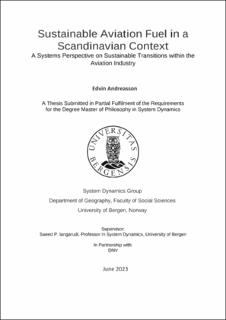Sustainable Aviation Fuel in a Scandinavian Context - A Systems Perspective on Sustainable Transitions within the Aviation Industry
Master thesis
Permanent lenke
https://hdl.handle.net/11250/3071864Utgivelsesdato
2023-06-02Metadata
Vis full innførselSamlinger
- Master theses [140]
Sammendrag
The aviation sector is a major contributor to global carbon emissions, accounting for approximately 2.5% of total global emissions. The main contributor to these emissions is the production and consumption of aviation fuel, hence, transitioning to sustainable aviation fuel (SAF) is a critical step towards reducing the industry’s carbon footprint. However, the adoption of SAF presents complex challenges that extend beyond environmental considerations and include industrial as well as business aspects. This paper focuses on the demand for SAF in the Scandinavian aviation industry and explores different pathways for its adoption. A system dynamics model is developed and simulated under varying parameters and scenarios to examine the transition to SAF. The results for each Scandinavian country are presented and discussed, along with potential policies to aid the transition. The overview is that biofuel is the first to be adopted, followed by e-fuel, and lastly hydrogen but the timing is varied with Sweden being the first to start adopting SAFs. The paper then identifies mechanisms that are better targets for intervention and can inform decision-making in the adoption of SAFs in the aviation industry. The study offers insights into the challenges and opportunities of transitioning to SAF and highlights the importance of a coordinated effort involving multiple stakeholders, including airlines, fuel producers, policymakers, and consumers.
